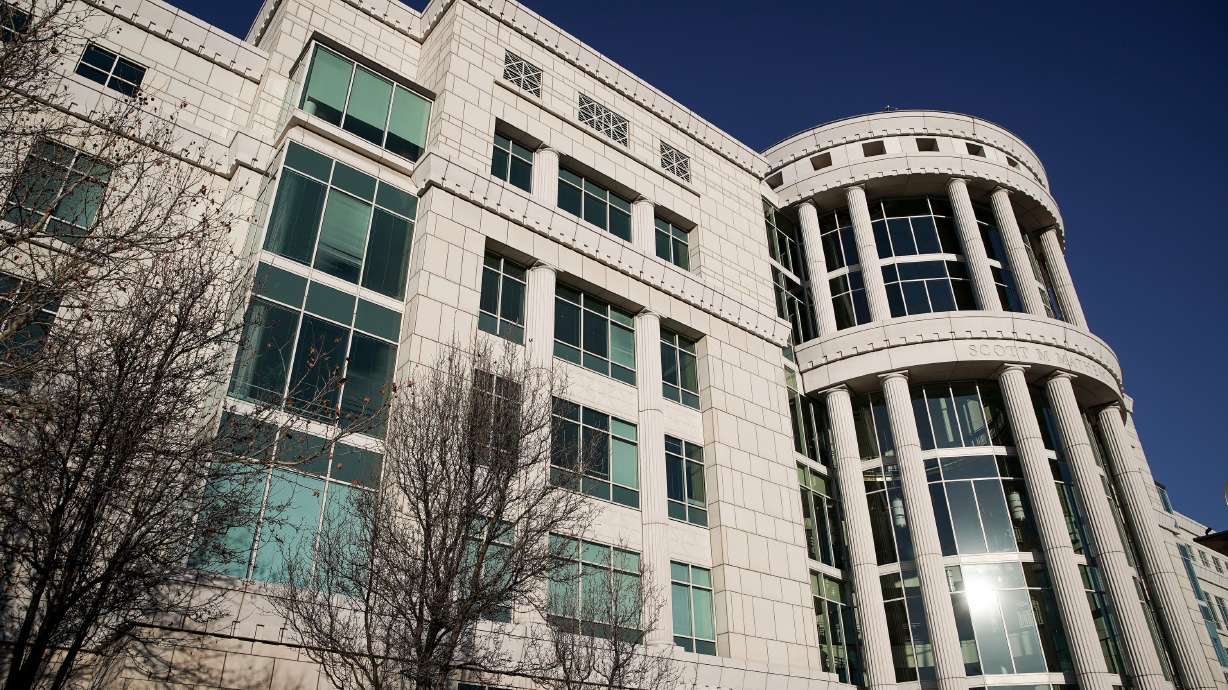Estimated read time: 4-5 minutes
This archived news story is available only for your personal, non-commercial use. Information in the story may be outdated or superseded by additional information. Reading or replaying the story in its archived form does not constitute a republication of the story.
SALT LAKE CITY — Third District Judge Kirsten Johnson on Tuesday denied a request for bail for a former Salt Lake City information technology employee charged with using his access to sensitive police information to help a human trafficking operation.
Police say Patrick Kevin Driscoll, 50, of Salt Lake City, was known as "the Guardian" because he used "his position as an employee at Salt Lake City to access law enforcement databases and other nonpublic sources and provide" inside information to Michael Joe Ricks, 49. Ricks is accused of being involved in prostitution and drug dealing and faces 15 felonies and misdemeanors. Police say the information helped keep Ricks' criminal activities undetected.
Prosecutor Kaytlin Beckett said Driscoll's actions caused significant damage to Salt Lake City and has required them to obtain an outside audit of their system and to sideline officers and resources.
"Mr. Driscoll's conduct allowed Mr. Ricks' scheme to continue on for several months. The amount of information that he provided Mr. Ricks is astounding," Beckett said.
She said the information Driscoll provided to Ricks included locations of undercover operations, undercover phone numbers for police officers, and information about undercover vehicles. Beckett argued that there would be a "severe public safety risk" if he were allowed to be released on bail.
"He is not an innocent player," the prosecutor said.
But Driscoll's attorney, Greg Ferbrache, said none of the allegations in the case are current, and that there would not be any "real time risk" to allowing him to be free while the case is being heard. He said the 50-year-old has no criminal history and is not violent.
"Even if he's convicted as alleged, he's a candidate for probation," Ferbrache argued.
He said the attempts to not allow Driscoll to be released on bail are not to ensure public safety, but instead are an attempt to punish Driscoll.
Patrick Driscoll's sister, Maureen Womack, said in the chat at the online hearing that Driscoll's family would cooperate and make sure that everyone was safe.
"I want to share my dismay at the mischaracterization of my brother and my prayer for relief is that he is released," she said.
Beckett said that although Driscoll is currently not charged with human trafficking, there is a possibility such charges could be filed against him, even from the federal system. She accused Driscoll of pretending to be a police officer in order to obtain more authority over the girls in the human trafficking operation and said victims have expressed fear of him and that they thought they could not turn him down. Beckett claimed that Driscoll would sometimes get paid for the help he gave the operation, but other times he would take "trades or credits" instead and would engage in commercial sex with the girls.
"There was an entire eight-month period where these girls were able to be exploited, these girls were able to be violently treated, they were forced to engage in commercial sex, strung out on drugs, and the exact reason for that is because of Mr. Driscoll's conduct. He simply supported a scheme knowing that it was a scheme, knowing that he would continue to have access to these girls if he continued to do this," Beckett told the judge.
Although Ferbrache argued that there is no evidence Driscoll knew that the people he was feeding information to were involved in human trafficking, Beckett said Driscoll had called in a tip saying that he suspected they were but still engaged in commercial sex with the girls even after that time.
The judge said it would be possible to limit Driscoll's access to the internet if he were released on bail to keep him from sharing more information, but she expressed concern about the trafficking victims who are not specified in the charges, saying they could be put in danger if she didn't require that he remain incarcerated.
Johnson explained that the constitutional right to bail is able to be limited when there are felony charges, and when the judge decides that there is evidence to support the felony charges, which she said there is in this case.
Driscoll is charged with three counts of obstructing justice plus engaging in a pattern of unlawful activity, second-degree felonies; two counts of computer crimes interfering with critical infrastructure, one a second-degree felony and the other a third-degree felony; aggravated exploitation of prostitution, a third-degree felony; and aiding prostitution, a class A misdemeanor.









